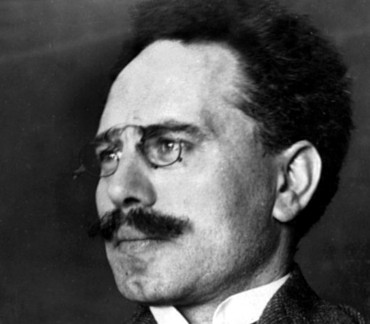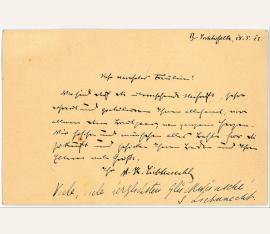Politiker (1871-1919). Autograph lettercard signed, with an autogr. postscript by Sonja Liebknecht. Berlin-Lichterfelde. 18.05.1913. 1 S. Qu.-8vo.
$ 80,400 / 75.000 €
(73918/BN47827)
To the sister of leading Social Democrat Hugo Haase (1863-1919), sending wishes regarding the wedding ceremony of a member of her family: "[…] We are very pleased by the surprising news and congratulate you all, especially the bride and groom, with all our heart […]". - Sophia Borissowna Ryss, called Sonja (1884-1964), was from 1912 onwards the second wife of Karl Liebknecht. - Small traces of mounting on reverse; very rare.
sold
Portraitpostkarte m. e. U.
Autograph ist nicht mehr verfügbar
Karl Liebknecht (1871-1919), linksradikaler Politiker, Mitglied des Reichstags, Mitbegründer der KPD. Porträtpostkarte m. e. U. auf der Bildseite, Luckau, 11. November 1917, eine Seite quer-8°. „Gef. Karl Liebknecht. Luckau 11. November 1917“. – Auf einer Ansichts-Postkarte, die auf der Adressenseite ein Foto mit Liebknecht als Armierungssoldaten mit Schubkarre zeigt, auf der Bildseite eine Zeichnung von Karl Arnold, „Frühstück an der Front“, die die Führer der Sozialdemokratie an einer opulenten Tafel karikiert, bei der reichlich Sekt serviert wird. - Liebknecht war wegen seiner aktiven Antikriegspolitik zu 2 ½ Jahren Zuchthaus verurteilt worden und von 1916 bis 1918 in der Justizvollzugsanstalt Luckau inhaftiert. - Sehr selten.

